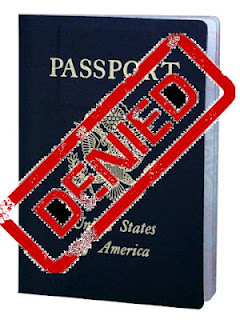
You Are Free To Travel—If The IRS Lets You
A bill that nobody is paying any attention to is sailing through Congress: Senate Bill 1813. It passed the Senate by 74 to 22, and is expected to sail through the House as well. It’s an act “[t]o reauthorize Federal-aid highway and highway safety construction programs, and for other purposes.”
It’s the “and for other purposes” part of the title that has me worried—specifically Section 40304: “Revocation or denial of passport in case of certain unpaid taxes.”
This section would give the IRS the power to keep a U.S. citizen from traveling—
—and it’s another example of Executive Power run amok. It’s another example of how the United States is turning into a police-state.
The right to travel freely is sacrosanct—it’s not some privilege that the government bestows on us: It’s one of our basic freedoms as citizens. In point of fact, the countries that have limited their citizens’ ability to travel—the Soviet Union, the People’s Republic of China, North Korea, Cuba—were all rightfully called “police-states”: It’s one of their defining characteristics—the fact that they were keeping their citizens hostage.

In the United States, there are several, clearly defined reasons why you would have your passport either denied or revoked—and all of them pass the smell test.
In the case of a passport being denied, according to the U.S. State Department, the reasons are:
“a federal warrant of arrest, a federal or state criminal court order, a condition of parole or probation forbidding departure from the United States (or the jurisdiction of the court), or a request for extradition [by a foreign country].
Additionally, failure to pay a court-ordered child-support in excess of $5,000 can also be grounds for the State Department to refuse to issue a passport to a U.S. citizen.
In the case of a passport being revoked, the law (22 CFR 51.72) says very clearly that:
A passport may be revoked or restricted or limited where:
(a) The national would not be entitled to issuance of a new passport under §51.70 or §51.71 [the above conditions]; or
(b) The passport has been obtained illegally, by fraud, or has been fraudulently altered, or has been fraudulently misused, or has been issued in error; or
(c) The Department of State is notified that a certificate of naturalization issued to the applicant for or bearer of the passport has been canceled by a federal court.
[54 FR 8532, Mar. 1, 1989, as amended at 64 FR 19714, Apr. 22, 1999]
Now, notice how both in the case of a denial or a revocation of a passport, the State Department is essentially carrying out the judgment of the courts.
An arrest warrant can only be issued by a court. A parolee is, again, limited under the aegis of a judicial order. An extradition request will only be complied if a foreign court is making the request, not a foreign law enforcement agency. A court-ordered child support payment is, again, a judicial decision.
In all of these cases, the State Department is acting on the orders of a court. It is the Judiciary that decides to restrict the freedom of movement and travel of a U.S. citizen—as is their exclusive prerogative.
According to the Constitution, the Legislature does not have the right to judge the guilt or innocence of a person, be they a citizen or not. According to the Constitution, the Executive does not have the right to judge the guilt or innocence of a person, be they a citizen or not.
According to the Constitution’s separation of powers, only the Judiciary has the right to determine guilt or innocence.
Thus, ultimately, only the Judiciary has the right to revoke or deny a citizen’s ability to travel—and only for serious crimes.
But with this Bill 1813, it will now be the IRS—without any judicial oversight—which will determine if a citizen can travel or not. Not even the IRS as an institution—just some random IRS bureaucrat, with no oversight or restraint, will be able to decide to strip you of your right to travel freely.
As written, Bill 1813 states that the IRS must find that $50,000 or more is owed by the citizen—but this is a unilateral determination by the IRS, and it includes penalties and interest. So the alleged amount that you owe could be substantially less—but you are now no longer allowed to travel.
Notice I say “alleged”: It is not that the IRS has to present proof of tax delinquency to anyone—they just have to say that you owe back taxes. No proof required, no judicial oversight or restraint.
In other words, the IRS’s word is enough—and you do not have the possibility of appeal. Who would you appeal to—a judge? There’s no judge in this case—because no judge supervises and monitors the IRS’s decision.
That’s why Madison invented the idea of checks-and-balances: To make sure that no one branch of the government acquired the power to deprive people of their life, liberty or property.
But here is Senate Bill 1813, doing precisely that.
Commentators on tax law are very surprised by this legislation. Over at the blog of R&G Brenner, a large and well-established New York tax preparation company, they wrote:
[I]f the bill is passed you could have your passport revoked merely because you owe say $60,000 and the IRS has filed a notice of lien. Bear in mind that the IRS files tax liens routinely when you owe taxes–it’s just the IRS way of putting creditors on notice so the IRS will eventually get paid… In that sense, this you-can’t-travel idea seems pretty extreme. [ellipsis in original]
So even knowledgeable people are surprised by how extreme this legislation is—
—because it is extreme. But more importantly, it is yet another example of how the Executive Branch is hollowing out the Judiciary, and taking control of all facets of justice.
We already have an Executive that has taken it upon itself to determine the guilt or innocence of an American citizen overseas—and execute him by drone strike. We already have an Executive—in the person of Attorney General Eric Holder—who has made the incredible distinction between “judicial process” and “due process”, claiming that the Executive can carry out due process without involving the Judiciary.
In other words, summary judgments. The Executive is becoming the judge, jury and executioner. Judgements by the Executive where there is no right to appeal. Judgments made not by a jury of your peers, but by a faceless bureaucrat.
 |
| This man will determine your fate. |
This Senate bill 1813 will in all likelihood pass the House vote, and be signed into law by President Obama. Few people will notice it now, and when the history of this shameful period is written it will not be given much pride of place: Senate bill 1813 will simply be mentioned as one more law that was passed that turned the United States from a free Republic into a closed Police-State.
If you’re interested, check out my Strategic Planning Group, where we discuss strategies for exiting America, when the time comes.
http://gonzalolira.blogspot.fr/2012/04/you-are-free-to-travelif-irs-lets-you.html
